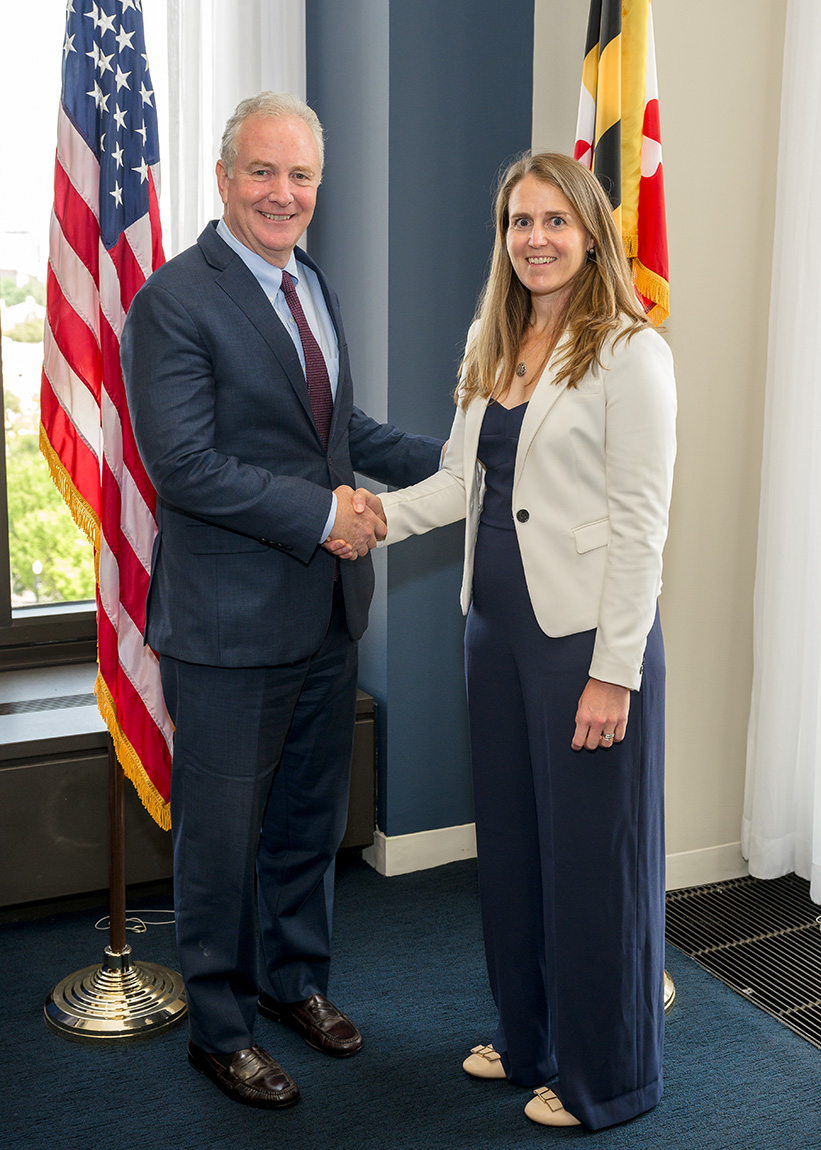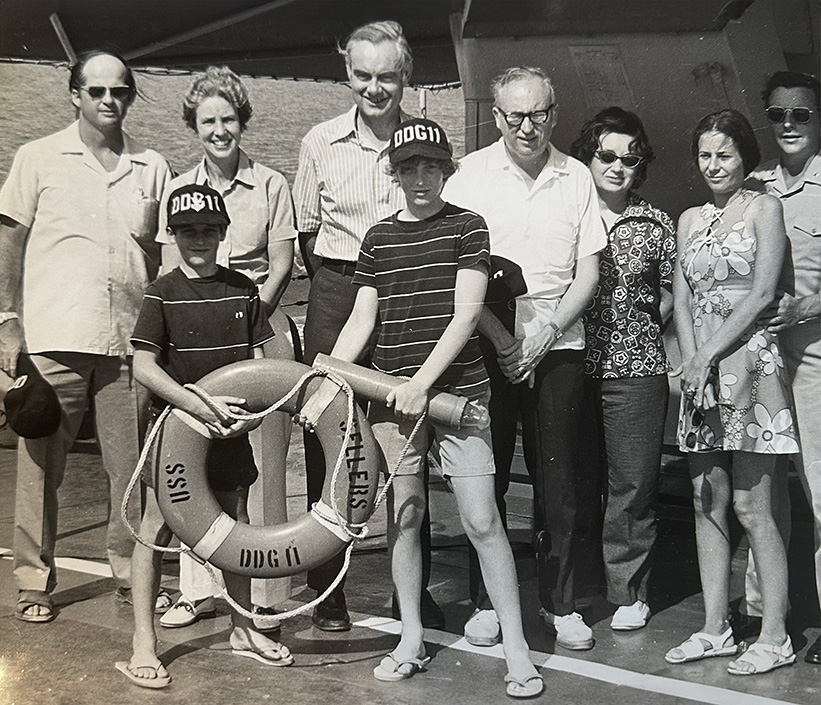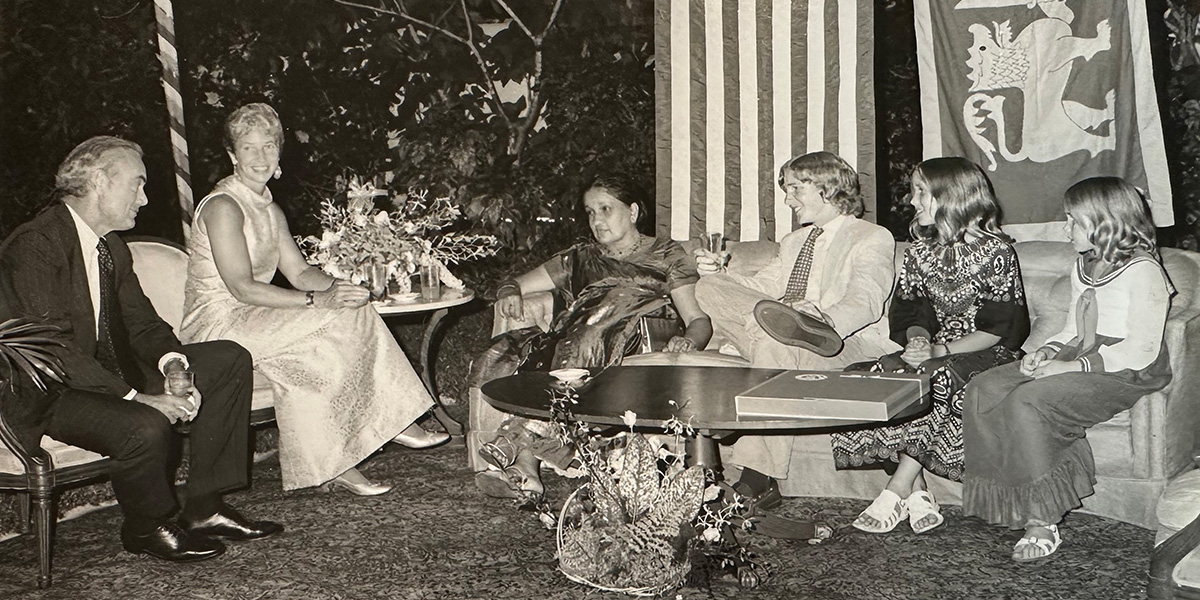From FS Kid to FS Champion in Congress: A Conversation with Senator Chris Van Hollen
Chris Van Hollen (D-Md.), an attorney and politician, has served as the junior U.S. senator from Maryland since 2017. Prior to that, he represented Maryland’s 8th congressional district in the House from 2003 to 2017. He is a founding co-chair, with Dan Sullivan (R-Alaska), of the Senate Foreign Service Caucus. The son of a career U.S. ambassador, he grew up in the Foreign Service. Editor in Chief Shawn Dorman spoke with him on June 3.

Senator Van Hollen with Pearson Fellow FSO Catherine Miller-Little.
Courtesy of Chris Van Hollen
FSJ Editor Shawn Dorman: I’d like to start by asking if you could say anything for our Foreign Service readers about what it meant growing up in the Foreign Service and how that has influenced your work and life.
Senator Chris Van Hollen: Yes, I was very proud to grow up in a Foreign Service family. My father’s family is from Baltimore originally, and then he went into the Navy and from there into the Foreign Service. My mother was the daughter of an English teacher, but she became a Russian language expert. She was very good at languages and actually worked at the forerunner of the CIA, the OSS. They met in Washington.
Back in those days, the Foreign Service was not nearly as friendly and accommodating of two-career spouses. And that’s part of my motivation for the legislation that I’ve worked on, including the Foreign Service Families Act.
But it was a great experience growing up overseas, like I think it is for most Foreign Service families. We were proud to represent the United States and support the values and principles we stand for. I will say, if you’re growing up in a Foreign Service family, it causes you to hold up a mirror and ask yourself whether we are as good back home as we represent ourselves overseas. And so that has also led me to push for social change here in the United States.
Growing up overseas, as you know, means moving back and forth. I was born in Karachi. We then came back to the United States, then to Türkiye, then back to the United States, then to Sri Lanka. When my father was posted in Sri Lanka, I went to boarding school in Southern India for ninth and 10th grade and then went back to the United States.
It was a very fulfilling experience to have that exposure to different peoples, different cultures, different religions, and I think it has served me well in a lot of other environments that I operate in. And it certainly means that when I look at U.S. foreign policy, I try to also look at it through the lens of people in other countries who are viewing our words and our actions and asking themselves whether or not we are being true to our principles and values. Growing up in the Foreign Service was a wonderful experience, and it informs a lot of what I do today.
Growing up in the Foreign Service was a wonderful experience, and it informs a lot of what I do today.
FSJ: Thanks very much. Now let’s talk about the GRATEFUL Act that you co-sponsored with Thom Tillis (R-N.C.) that was signed into law in December 2023 as part of the 2024 National Defense Authorization Act. This legislation repurposed a visa program that had been sparsely used in recent years to provide foreign U.S. government employees with at least 15 years of exceptional service to the U.S. abroad, and their families, with an efficient path to immigrate to the United States. A lot of people, even inside the Foreign Service, don’t know about this renewed and renamed Government Employee Immigrant Visa (GIV) program. How did the legislation come about?
Sen. Van Hollen: Having grown up in a Foreign Service family, I understand the vital role our hardworking Foreign Service nationals [now called locally employed staff] play in all aspects of our diplomacy.
We set up the Special Immigrant Visa program a long time ago to allow them and their families to come to the United States after their service. But for a variety of reasons, a huge backlog developed. As a practical matter, it became a broken system. I not only heard from our ambassadors and others at the embassies and consulates but also had a chance to meet with some of these Foreign Service nationals during my travels, and I recognized how important this was.
I was lucky to have a Pearson Fellow as part of our team, [FSO] Catherine Miller-Little. Catherine was familiar with this issue and is a consular-coned officer. And so we got to work on trying to formulate a solution to this very real problem that was hurting our foreign policy, because America does need to make good on its promises, and this was a promise that we’d made but were not keeping. So that was the genesis of the GRATEFUL Act.
As you know, in Congress it’s gotten harder and harder to pass smaller bills on their own. They need to hitch a ride on a larger legislative vehicle. There were significant negotiations with some of the House members, because immigration issues writ large, as you know, are very polarizing and sensitive. And so we needed to really explain how this was necessary to advance our foreign policy interests, our national security interests.
The main thing is: The United States made this commitment, and there are a lot of individuals who provided loyal and dedicated service for a long time only to discover that this option was no longer available as a practical matter. That’s why we had to make this change.

The Van Hollen family and friends on board the U.S. Navy’s USS Sellers. The “delegation” traveled to the Republic of Maldives from Colombo. Back row, from left: Steve Montgomery, E.E. Van Hollen, Ambassador Christopher Van Hollen, Gil Wing, Doris Wing, Nancy Seger, and Ralph Seger. Front, from left: Dick Seger and Christopher Van Hollen Jr.
Courtesy of Chris Van Hollen
FSJ: Yes, and thank you for that. Now let’s move over to the Foreign Service Families Act, another really helpful piece of legislation for the Foreign Service community. That passed as part of the 2022 National Defense Authorization Bill.
The act has helped expand employment options as well as other support services for FS family members similar to those already available to military families to alleviate the challenges that come with life in the Foreign Service, such as frequent moves and language barriers. Can you tell us how you came to advocate for this and how it’s going?
Sen. Van Hollen: When I came to the U.S. Senate, I teamed up with Dan Sullivan, a Republican senator from Alaska who had also served earlier in the State Department under the second Bush administration. He had a real interest in national security and foreign policy. Long story short, we formed the [Senate] Foreign Service Caucus to create a bipartisan forum to address the needs of the Foreign Service but also [those of] civil servants within the State Department.
There are lots of other caucuses. There’s an Air Force caucus, an Army caucus. Under the umbrella of the Defense Department, you’ve got multiple caucuses that support the men and women who are part of the military services. So, we thought it was very important to create a similar caucus in support of the Foreign Service. And one of the things we got to work on was drafting the Foreign Service Families Act.
I present that background because one of the models we looked at was the kind of benefits that are provided to military family members when they are deployed overseas. The military had established a number of programs to make it easier for spouses of service members deployed overseas to find interesting and productive work.
We decided to apply a similar model to the Foreign Service, and it included a number of provisions to create more opportunities for Foreign Service spouses who are part of the embassy overseas, and also some other very tangible benefits—for example, making sure that Foreign Service families domiciled in a particular state are granted in-state tuition for public universities while posted overseas. The Foreign Service Families Act was sort of the anchor that we wanted to build on.
A group of us, years ago, set forward what we thought should be the architecture and funding for a foreign policy budget. It was significantly more robust than what’s available today.
FSJ: Do you have any related priority issues on your list for 2025?
Sen. Van Hollen: Now we’re going back to look at some other areas [where we can help]. For example, making sure that Foreign Service families overseas get internet coverage—we were successful at getting this applied to hardship posts, but we want it to be applied universally.
There’s another issue that applies mostly to folks who are involved in diplomatic security: I mentioned earlier the Foreign Service Families Act allows people to get out of rental contracts when they’re told to move overseas, but it did not apply when you’re required to move from one part of the United States to another, so we’re working on extending that protection.
There’s an issue with the portability of professional licenses that’s come up. There’s a childcare subsidy issue. There’s a series of additional benefits that we’re trying to put together to address some of these issues. Again, the foundation stone was the Foreign Service Families Act, but as issues come up, we try to identify ways we can be helpful, to show support for Foreign Service families and others who are part of our embassies and consulates overseas and the State Department here at home.

The Van Hollen family enjoys an audience with Sri Lankan Prime Minister Sirimavo Bandaranaike (center) on July 4, 1975.
Courtesy of Chris Van Hollen
FSJ: Can you say anything about the budget picture, and is there anything that AFSA should be doing to be helpful in advocating for an appropriate budget for the foreign affairs agencies?
Sen. Van Hollen: My view is we need to be providing more resources to support the Foreign Service. We need to establish more consulates. My father, when he was ambassador to Sri Lanka, was also assigned to the Maldives. I’m glad to see we now have an ambassador to the Maldives.
As you know, the Maldives is a pretty small country of far-flung islands, but it is of growing significance in the Indo-Pacific region. I think we need to be in more places like this, and we need to make sure we have a robust diplomacy budget to do this. We have a very robust defense budget, but we need to do more on the diplomacy and the development side.
We are still operating under a two-year agreement that the Biden administration negotiated with the House Republicans. And that does create very real budget constraints that unfortunately are going to limit our capacity to do some of the things we should be doing in the area of diplomacy. But we will do our very best to allocate the resources available in a smart way.
A group of us, years ago, set forward what we thought should be the architecture and funding for a foreign policy budget. It was significantly more robust than what’s available today. Again, growing up as part of the Foreign Service family, I’ve seen firsthand the benefits to our country of having a robust diplomatic presence and engagement. And that’s even more true today.
Back at that time, we had a bipolar world. It was the United States and the Soviet Union, and we were competing. And now we’re competing for influence in a lot more places and with a lot more players. It’s going to be very important that we adequately resource our Foreign Service.
When sharing or linking to FSJ articles online, which we welcome and encourage, please be sure to cite the magazine (The Foreign Service Journal) and the month and year of publication. Please check the permissions page for further details.



